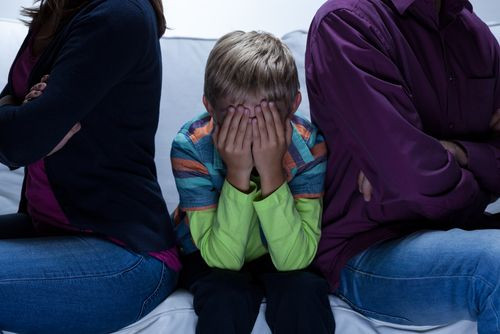Domestic Violence Hurts Kids’ Ability To Read Emotions And Regulate Their Own

Kids who witness their parents fighting have trouble recognizing other people’s emotions and regulating their own, finds a new study from New York University on the collateral damage of domestic violence.
The study also suggests household chaos and chronic poverty take a similar toll on young minds. Not only are the financial and health-related concerns an issue for children, but their emotional intelligence and psychological well-being is at stake. Instability at home translates into poor performance, academically and socially, in school. Helping to reduce kids’ suffering could go a long way toward fixing other ailments that may be branching off.
"This study shines a bright light on the importance of supporting parents as they navigate the ups and downs of partnership or marriage," said C. Cybele Raver, professor of applied psychology at NYU, in a statement.
When parents encounter financial hardship and personal turmoil, that’s when anger management strategies are needed the most, Raver added, because the net effect is a budding generation taking its cues from them. In their study, the team looked at several forms of adversity, tracking behavior outcomes among 1,025 children from the time they were 2 months old until they were just under 5.
They made house visits, issued parent questionnaires, administered tasks to both parents and children, and measured the level of household chaos — defined as the number of times families moved, changes in caregiver, noise levels, and the number people compared to the number of rooms. At 4 years and 10 months, they evaluated kids’ abilities to spot specific emotions.
Verbal and physical aggression were two of the greatest predictors of emotional recognition skills. Interestingly, while physical aggression predicted poorer skills, verbal aggression actually predicted kids would have better abilities at recognizing particular emotions — perhaps because the emotions found in a person’s words are more easily deduced than the emotion behind a slap or punch.
As expected, both forms of aggression predicted kids’ poorer ability to regulate their own emotions. When sad, they were less able to develop coping strategies on their own. The same played out when they were fearful and withdrawn. The researchers found this finding of particular concern because it could lay a dangerous foundation for depression and anxiety later in life.
Among the other influencers in the study, kids were most likely to suffer emotional deficits when they spent a greater number of years in poverty and when their homes were disorganized. According to Raver, the findings put the onus on parents in poverty, or approaching poverty. Too often, she said, they “need help regulating their own feelings of anger, frustration, and worry when balancing the demands of work, family, and romantic partnership, especially when money is tight.”
Prior research has found these cycles of poverty not only to be near-impossible to break, but actually affect the future generation’s DNA. In April, researchers discovered kids in poverty had older genes than kids of wealthier families. Coupled with the latest findings, the body of research paints poverty as far more than a socioeconomic bracket. It’s an entirely different world, filled with unique challenges and an overwhelming number of risks.
"Arguing and fighting is psychologically stressful for the adults caught in conflict,” Raver said. “This study demonstrates the costs of that conflict for children in the household as well."
Source: Raver C, Blair C, Garrett-Peters P, et al. Poverty, household chaos, and interparental aggression predict children's ability to recognize and modulate negative emotions. Development and Psychopathology. 2014.
Published by Medicaldaily.com



























